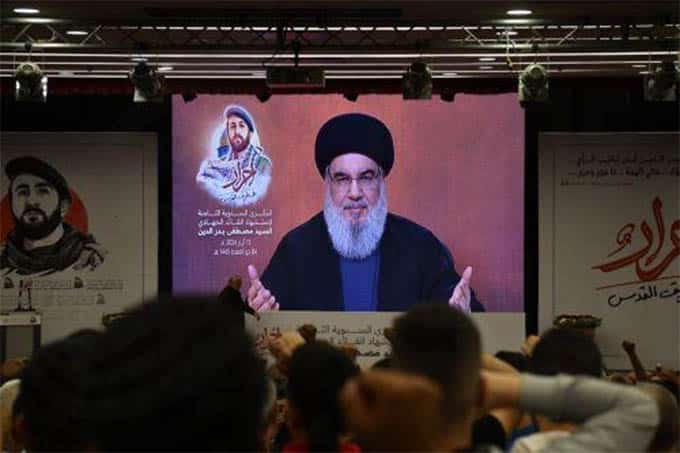The government was in contact with Lebanese authorities on Tuesday over statements made by Hezbollah leader Hassan Nasrallah, who called on Lebanon to “open the sea” so that Syrian migrants can make their way to Cyprus.
Government spokesman Konstantinos Letymbiotis addressing the issue after a meeting of President Nikos Christodoulides with Italian MP Piero Fascino, said the message conveyed by the Hezbollah leader was of concern.
Nasrallah, in a live televised speech on Monday, urged Lebanese authorities to permit the refugees to come to Cyprus in a bid to put pressure on Europe.
Nasrallah said a national decision should be made to “open the sea to anyone who wants to leave for Europe, for Cyprus, the European Union country closest to the Middle East.” He hastened to add that he was not suggesting that Syrians should be forcibly removed.
Letymbiotis noted that, “from the first moment […] we have stated is that increased immigration flow [to] our country is an eminently European issue,” adding that Nasrallah’s statement that Cyprus is the closest EU state was simply a reality.
Asked whether this latest development in the volatile region could jeopardise the recently concluded EU-Lebanon aid agreement, Letymbiotis said the issue was at the forefront of the government’s priorities.
“[The president] took a timely initiative [to travel to Lebanon] with the President of the European Commission a few weeks ago, to present this economic aid [package which] includes [provisos] for [stemming] migration flows from Lebanon to Europe and especially to Cyprus,” the spokesman said.
Lebanon, mired in an unprecedented economic crisis since 2019, is host to nearly two million Syrian refugees — the highest per capita ratio in the world — and has repeatedly called on the international community to see to their repatriation.
Diplomatic sources told the Cyprus Mail that Nasrallah’s remarks should be read in the context of “internal power games” in Lebanon.
“It’s probably about who controls what areas in Lebanon,” said the sources, who spoke on condition of anonymity.
Another explanation, but not a mutually exclusive one, is that Nasrallah intended to exert pressure on the Lebanese prime minister, in the expectation that the latter would in turn leverage the ‘threat’ of sending Syrians to Cyprus as a means of pressing the EU to speed up the pledged delivery of aid to Lebanon.
President of the European Commission, Ursula von der Leyen, recently announced in Beirut the granting of €1 billion in aid to Lebanon, intended primarily to prevent irregular immigration. The announcement was criticized by many in Lebanon who see its real purpose as being the establishment of Syrian refugees in their country.
Some factions blame the refugees for their country’s worsening conditions and pressure is intensifying in the leadup to the annual EU summit on Syria, slated to take place on May 27.
Nasrallah in his speech had said that as long as Syrian refugees are prevented by the Lebanese army from leaving, they will turn to people smugglers with inflatable boats, and drown at sea.
He moreover demanded that the Lebanese parliament exert pressure on the EU and the United States to effect a lifting of sanctions against Damascus which, according to the Syrian government, are hindering efforts to distribute humanitarian aid and start a reconstruction process in that country.
Western states ought to begin reconstruction in Syria, Nasrallah said, saying Lebanon must [tell them] “we must all coordinate with the Syrian government to send the expatriates to Syria and offer them assistance there.”
The leader of the powerful Lebanese Shiite movement made his statements on the eve of the resumption of voluntary returns of Syrians from Lebanon to their homeland, a year and a half after they were suspended.
Human rights defenders have warned of risk of arbitrary arrest and torture of returning Syrians.
The highly complex war in Syria, which broke out in 2011, triggered by the authorities’ crackdown on democratisation protests, has claimed the lives of more than half a million people and turned millions more into internally displaced persons and refugees.







Click here to change your cookie preferences